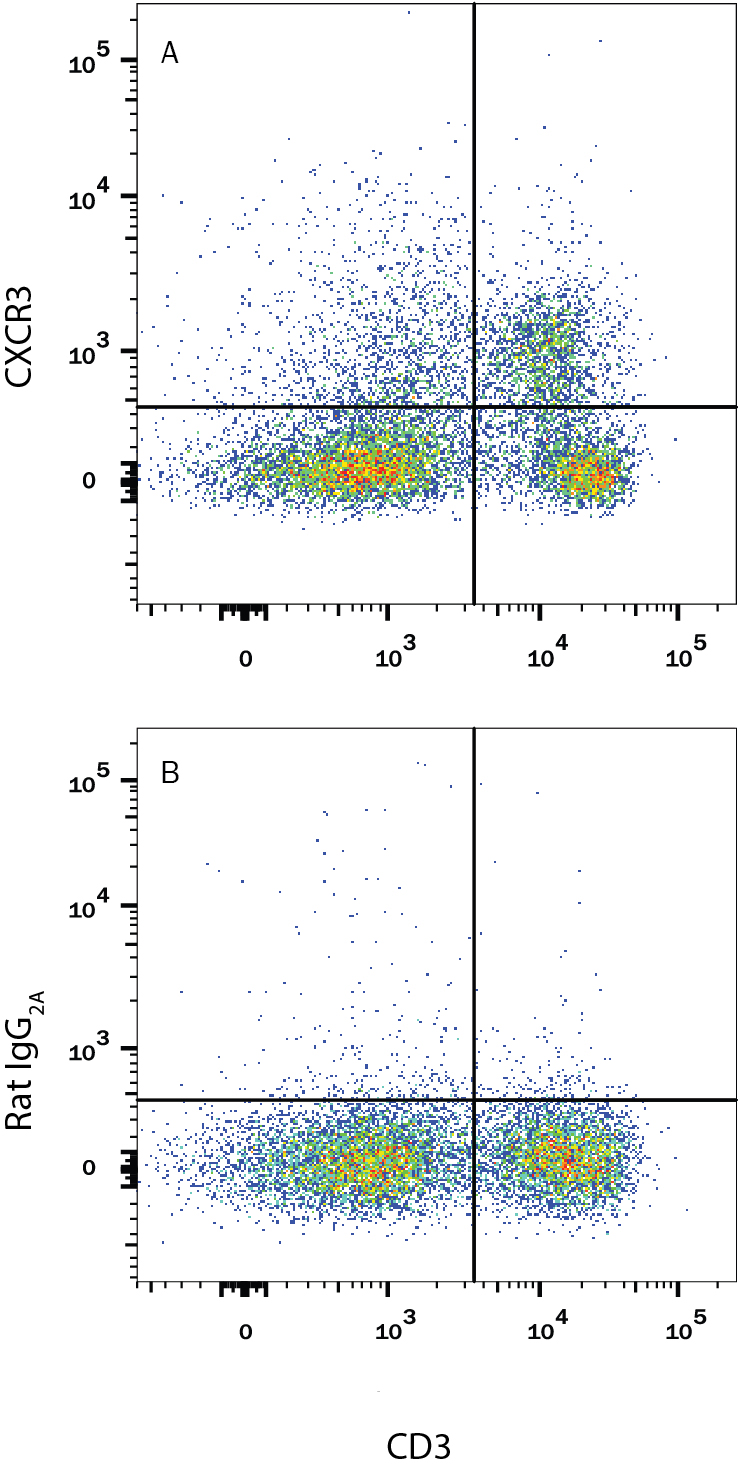Mouse CXCR3 APC-conjugated Antibody Summary
Applications
Please Note: Optimal dilutions should be determined by each laboratory for each application. General Protocols are available in the Technical Information section on our website.
Scientific Data
 View Larger
View Larger
Detection of CXCR3 in Mouse Splenocytes by Flow Cytometry. Mouse splenocytes were stained with Rat Anti-Mouse CD3 PE-conjugated Monoclonal Antibody (Catalog # FAB4841P) and either (A) Rat Anti-Mouse CXCR3 APC-conjugated Monoclonal Antibody (Catalog # FAB1685A) or (B) Rat IgG2AAllophycocyanin Isotype Control (Catalog # IC006A). View our protocol for Staining Membrane-associated Proteins.
Reconstitution Calculator
Preparation and Storage
- 12 months from date of receipt, 2 to 8 degreesC as supplied.
Background: CXCR3
CXCR3 is a G protein coupled chemokine receptor that binds the alpha chemokines MIG (CXCL9), IP-10 (CXCL10) and I-TAC (CXCL11). CXCR3 is expressed on activated T cells, B cells and NK cells.
Product Datasheets
Citations for Mouse CXCR3 APC-conjugated Antibody
R&D Systems personnel manually curate a database that contains references using R&D Systems products. The data collected includes not only links to publications in PubMed, but also provides information about sample types, species, and experimental conditions.
6
Citations: Showing 1 - 6
Filter your results:
Filter by:
-
Cryptococcus gattii infection dampens Th1 and Th17 responses by attenuating dendritic cell function and pulmonary chemokine expression in the immunocompetent hosts.
Authors: Angkasekwinai P, Sringkarin N, Supasorn O, Fungkrajai M, Wang Y, Chayakulkeeree M, Ngamskulrungroj P, Angkasekwinai N, Pattanapanyasat K
Infect Immun, 2014-06-30;82(9):3880-90.
Species: Mouse
Sample Types: Whole Cells
Applications: Flow Cytometry -
The developmental pathway for CD103(+)CD8+ tissue-resident memory T cells of skin.
Authors: Mackay L, Rahimpour A, Ma J, Collins N, Stock A, Hafon M, Vega-Ramos J, Lauzurica P, Mueller S, Stefanovic T, Tscharke D, Heath W, Inouye M, Carbone F, Gebhardt T
Nat Immunol, 2013-10-27;14(12):1294-301.
Species: Mouse
Sample Types: Whole Cells
Applications: Flow Cytometry -
Early differentiated CD138(high) MHCII+ IgG+ plasma cells express CXCR3 and localize into inflamed kidneys of lupus mice.
Authors: Lacotte S, Decossas M, Le Coz C, Brun S, Muller S, Dumortier H
PLoS ONE, 2013-03-08;8(3):e58140.
Species: Mouse
Sample Types: Whole Cells
Applications: Flow Cytometry -
CXCL9 causes heterologous desensitization of CXCL12-mediated memory T lymphocyte activation.
Authors: Giegold O, Ogrissek N, Richter C, Schroder M, Herrero San Juan M, Pfeilschifter J, Radeke H
J Immunol, 2013-02-27;190(7):3696-705.
Species: Mouse
Sample Types: Whole Cells
Applications: Flow Cytometry -
Chemokine receptor CXCR3 promotes growth of glioma.
Authors: Liu C, Luo D, Reynolds BA
Carcinogenesis, 2010-11-03;32(2):129-37.
Species: Mouse
Sample Types: Whole Cells
Applications: Flow Cytometry -
Chemokine gene expression during fatal murine cerebral malaria and protection due to CXCR3 deficiency.
Authors: Miu J, Mitchell AJ, Muller M, Carter SL, Manders PM, McQuillan JA, Saunders BM, Ball HJ, Lu B, Campbell IL, Hunt NH
J. Immunol., 2008-01-15;180(2):1217-30.
Species: Mouse
Sample Types: Whole Cells
Applications: Flow Cytometry
FAQs
No product specific FAQs exist for this product, however you may
View all Antibody FAQsReviews for Mouse CXCR3 APC-conjugated Antibody
There are currently no reviews for this product. Be the first to review Mouse CXCR3 APC-conjugated Antibody and earn rewards!
Have you used Mouse CXCR3 APC-conjugated Antibody?
Submit a review and receive an Amazon gift card.
$25/€18/£15/$25CAN/¥75 Yuan/¥2500 Yen for a review with an image
$10/€7/£6/$10 CAD/¥70 Yuan/¥1110 Yen for a review without an image



